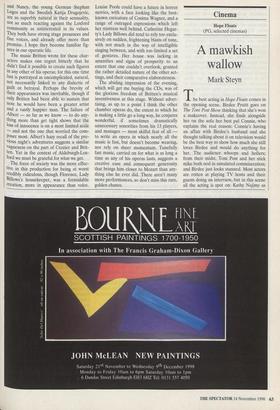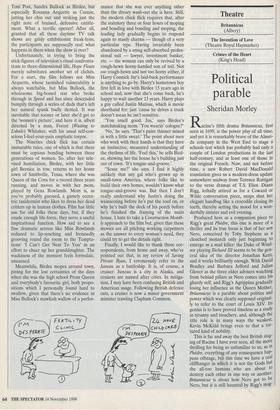Cinema
Hope Floats (PG, selected cinemas)
A mawkish wallow
Mark Steyn The best acting in Hope Floats comes in the opening scene. Birdee Pruitt goes on The Toni Post Show thinking that she's won a makeover. Instead, she finds alongside her on the sofa her best pal Connie, who explains the real reason: Connie's having an affair with Birdee's husband and she thought talking about it on television would be the best way to show how much she still loves Birdee and would do anything for her. The audience whoops and hollers; from their midst, Toni Post and her stick mike both nod in simulated commiseration; and Birdee just looks stunned. Most actors are rotten at playing TV hosts and their guests doing an interview, but in this scene all the acting is spot on: Kathy Najimy as Toni Post, Sandra Bullock as Birdee, but especially Rosanna Arquette as Connie, jutting her chin out and striking just the right note of bruised, defensive entitle- ment. What a terrific opener! After all, granted that all these daytime TV talk shows are grisly exhibitionist freak-fests, the participants are supposedly real: what happens to them when the show is over?
Unfortunately, in trying to bring the stick-figures of television's ritual confronta- tions to three-dimensional life, Hope Floats merely substitutes another set of clichés. For a start, the film follows not Miss Arquette, whose tarnished vulnerability is always watchable, but Miss Bullock, the wholesome big-boned star who broke through in Speed and has since descended bumpily through a series of duds that's left her natural spunk badly dented. It was inevitable that sooner or later she'd get to the `women's picture', and here it is, albeit directed by a man, Forest (Waiting to Exhale) Whitaker, with his usual self-con- scious I-feel-your-pain emphatic torpor.
The Nineties chick flick has certain immutable rules, one of which is that there must be copious bonding between three generations of women. So, after her tele- vised humiliation, Birdee, with her little girl Bernice in tow, returns to her home town of Smithville, Texas, where she was Queen of the Corn for a record three years running, and moves in with her mom, played by Gena Rowlands. Mom is, as you've probably guessed, a gamely eccen- tric taxidermist who likes to dress her dead critters up in human clothes. Film has little use for old folks these days, but, if they exude enough life-force, they serve a useful inspirational function. How sad to see a fine dramatic actress like Miss Rowlands reduced to lip-synching and frenziedly grooving round the room to the Tempta- tions' I Can't Get Next To You' in an effort to cheer up her granddaughter. The wackiness of the moment feels formulaic, unearned.
Meanwhile, Birdee mopes around town, pining for the lost certainties of the days when she was the high school Prom Queen and everybody's favourite girl, both propo- sitions which I personally found hard to swallow, given that there's no evidence in Miss Bullock's mawkish wallow of a perfor- mance that she was ever anything other than the dreary wash-out she is here. Still, the modern chick flick requires that, after the statutory three or four hours of moping and bonding and bonding and moping, the leading lady gradually begins to respond again to manly charms — though of a very particular type. Having invariably been abandoned by a smug self-absorbed profes- sional suit — lawyer, investment banker, etc. — the woman can only be revived by a rough-hewn horny-handed son of toil. Not too rough-hewn and not too horny either, if Harry Connick Jnr's laid-back performance is anything to go by. Harry's hometown boy first fell in love with Birdee 15 years ago in school and, now that she's come back, he's happy to wait another 15 years. Harry plays a guy called Justin Matisse, which is movie shorthand for: just 'cause he drives a truck doesn't mean he isn't sensitive.
`You smell good, Jus,' says Birdee's matchmaking mom. 'You wearin' cologne?'
`No,' he says. 'That's paint thinner mixed in with a little sweat.' The point about men who work with their hands is that they have an instinctive, measured understanding of the rhythms of life. 'Feel this,' he tells Bird- ee, showing her the house he's building just out of town. 'It's tongue-and-groove.'
"Scuse me?' she says. I find it highly unlikely that any gal who's grown up in small-town America, where folks like to build their own homes, wouldn't know what tongue-and-groove was. But then I don't really understand why Justin's doing the wainscoting before he's put the roof on, or why he's built the deck of his porch before he's finished the framing of the main house. I hate to take a Construction Month- ly approach to the film but, given that these movies are all pitching working carpenters as the answer to every woman's need, they could try to get the details right.
Finally, I would like to thank those cor- respondents, from home and away, who've pointed out that, in my review of Saving Private Ryan, I erroneously refer to the Juneau as a battleship. It is, of course, a cruiser: Juneau is a city in Alaska, and cruisers are named after cities. In mitiga- tion, I may have been confusing British and American usage. Following British defence cuts, a cruiser is now a minor government minister trawling Clapham Common.



















































































 Previous page
Previous page